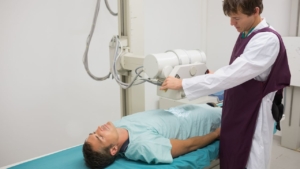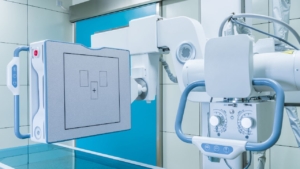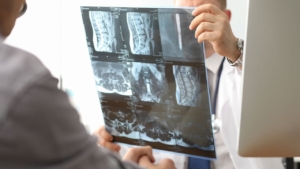Key Takeaways:
- Contrast Media Role: Contrast agents enhance image clarity by altering how tissues interact with imaging modalities, improving diagnostic accuracy.
- Iodine-Based Contrast: Used primarily in CT scans, iodine-based agents enhance the visibility of blood vessels and organs.
- Gadolinium-Based Contrast: Ideal for MRI, gadolinium agents provide superior soft tissue contrast for neurological and oncological imaging.
- Safety Considerations: Careful patient selection, dose optimization, and monitoring are crucial to minimize risks and ensure patient safety.
- Advancements: Ongoing research focuses on developing safer, more efficient contrast agents and integrating AI for personalized imaging.
Contrast agents are an integral part of medical imaging, enhancing the clarity and accuracy of diagnostic procedures.
Iodine-based contrast agents and gadolinium-based contrast media are the two most commonly used substances, each tailored to specific modalities like CT and MRI.
Understanding the role of contrast media in diagnostics is essential for achieving precise results and improving patient care.
The Science Behind Contrast Agents in Medical Imaging
Contrast agents work by altering the absorption or emission of energy within tissues during imaging procedures, providing enhanced differentiation between normal and abnormal structures.
Iodine-based contrast agents are highly effective in absorbing X-rays, while gadolinium-based contrast media influence magnetic properties in MRI scans.
This science enables radiologists to visualize areas of concern with exceptional clarity, supporting accurate diagnostics and targeted treatment.
Why Are Contrast Agents Important in Medical Imaging?
Contrast agents in medical imaging work by altering how tissues interact with imaging modalities, making abnormalities more visible.
They enhance diagnostic clarity, enabling healthcare providers to identify conditions that might otherwise be missed.
Key benefits include:
- Enhanced visibility: Structures like blood vessels, soft tissues, and organs are easier to differentiate.
- Improved diagnostic accuracy: Early detection and precise diagnosis of diseases are facilitated.
- Support for diverse imaging techniques: From CT scans to MRI, contrast agents are versatile diagnostic tools.
These benefits underscore the significance of contrast media in advancing modern diagnostics.
Iodine-Based Contrast Agents: CT Imaging Applications
Iodine-based contrast agents are widely used in CT imaging to visualize vascular systems and internal organs with exceptional clarity.
Applications of iodinated contrast media include:
- Vascular imaging: Detecting blockages, aneurysms, and arterial abnormalities.
- Organ diagnostics: Highlighting organs like the liver, kidneys, and pancreas.
- Tumor detection: Differentiating between benign and malignant growths.
With their broad applications, iodine-based agents remain a cornerstone in CT imaging.
Gadolinium-Based Contrast Media: MRI Enhancements
Gadolinium-based contrast media is designed for use in MRI, providing superior imaging of soft tissues and the central nervous system. These agents are highly effective in conditions where detailed visualization is critical.
Advantages of gadolinium compounds in MRI include:
- Enhanced soft tissue contrast: Ideal for brain, spine, and musculoskeletal imaging.
- Reduced allergic reactions: Generally safer for patients with sensitivities to iodinated agents.
- Longer imaging windows: Prolonged visibility for complex diagnostic procedures.
These features make gadolinium agents indispensable for MRI imaging applications.
Comparing CT and MRI Contrast Agents
While iodine-based contrast agents and gadolinium-based contrast media share similarities, their use is dictated by specific diagnostic needs.
Key comparisons include:
- Modalities used: Iodine is typically for CT scans, while gadolinium is exclusive to MRI.
- Tissue visualization: Gadolinium is better for soft tissues; iodine excels in vascular imaging.
- Risk profiles: Both agents require careful patient screening to ensure safe use.
Understanding these differences ensures the optimal selection of contrast agents in medical imaging.
Applications of Iodinated Contrast Media in Complex Cases
Applications of iodinated contrast media extend beyond standard imaging to address complex diagnostic challenges.
Key applications include:
- Cardiovascular imaging: Detecting heart and vessel abnormalities with precision.
- Oncology: Staging and monitoring tumors for treatment planning.
- Emergency imaging: Rapid diagnostics for trauma and acute conditions.
Iodine-based agents play a vital role in tackling intricate diagnostic scenarios, improving patient outcomes.
Specialized Uses of Gadolinium-Based Contrast Media
Gadolinium-based contrast media are invaluable in specialized imaging scenarios where detailed visualization is required.
Specialized uses include:
- Neurological imaging: Diagnosing conditions like multiple sclerosis and brain tumors.
- Musculoskeletal imaging: Assessing joint injuries and soft tissue abnormalities.
- Vascular imaging: Highlighting blood flow dynamics in arteries and veins.
Their ability to deliver detailed and accurate results makes gadolinium agents critical in advanced diagnostic procedures.
Advances in CT and MRI Contrast Agents
Technological advancements in CT and MRI contrast agents are transforming the landscape of medical imaging.
Recent innovations include:
- Dual-energy CT scans: Combining iodinated contrast media with advanced imaging techniques for superior diagnostic clarity.
- Macrocyclic gadolinium agents: Designed to reduce toxicity and improve safety profiles.
- AI-assisted protocols: Enhancing imaging efficiency and optimizing contrast use for individual patient needs.
These advancements ensure that contrast agents remain at the forefront of diagnostic innovation.
Ensure Safe Use of Contrast Media in Diagnostics
The safe use of contrast media in diagnostics is paramount for minimizing risks while achieving accurate imaging results.
Best practices include:
- Conducting thorough patient assessments to identify potential allergies or contraindications.
- Using the lowest effective dose to balance diagnostic needs and safety.
- Monitoring patients closely during and after imaging for any adverse reactions.
Adhering to these practices guarantees both patient safety and diagnostic accuracy.
Enhance Diagnostic Accuracy with Contrast Media
Both iodine-based contrast agents and gadolinium-based contrast media contribute significantly to enhancing diagnostic accuracy with contrast media.
Their ability to improve visualization and differentiation ensures that healthcare providers can detect and treat conditions effectively.
Applications include:
- Early diagnosis: Identifying conditions at initial stages for timely intervention.
- Comprehensive evaluations: Providing detailed insights into complex medical cases.
- Improved patient outcomes: Enabling precise treatment planning and monitoring.
By leveraging these agents, healthcare teams can achieve better diagnostic and therapeutic outcomes.
The Future of Diagnostic Imaging Agents
The future of diagnostic imaging agents is focused on improving safety, efficacy, and accessibility.
Emerging trends include:
- Development of contrast agents tailored for specific medical conditions.
- Eco-friendly agents designed to minimize environmental impact.
- Broader integration of AI to personalize contrast agent use and improve imaging workflows.
These innovations will continue to push the boundaries of what’s possible in medical imaging, enhancing both diagnostic capabilities and patient outcomes.
Take Your Diagnostic Imaging to the Next Level with Advanced Contrast Media
Achieve precision in diagnostics with tailored solutions for iodine-based contrast agents and gadolinium-based contrast media. Ensure patient safety and enhance imaging outcomes with cutting-edge products and expert support.
Contact Spectrum Medical Imaging Co. today at 800-859-6162 to explore our range of innovative contrast media solutions!




